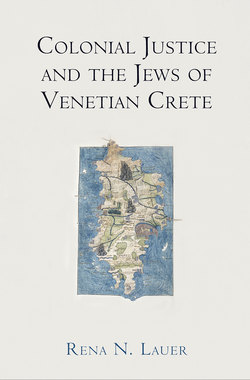Colonial Justice and the Jews of Venetian Crete

Реклама. ООО «ЛитРес», ИНН: 7719571260.
Оглавление
Rena N. Lauer. Colonial Justice and the Jews of Venetian Crete
Отрывок из книги
Colonial Justice and the Jews of Venetian Crete
Ruth Mazo Karras, Series Editor
.....
No state benefited more from, or was more changed by, the Fourth Crusade than Venice. By 1100, Venice had begun to extend its naval power beyond the Adriatic. The goal was commercial expansion, and in the next century, the Republic harnessed the economic potential of the Crusader States for its own goals. Venice secured trading concessions from the Latin rulers of the Levant in return for occasional military assistance, particularly gaining mastery of the Levantine coast in the 1120s.50 In the century before the Fourth Crusade, Venetian traders expanded their foothold across the wider eastern Mediterranean, building on inroads constructed before the Crusades. Evidence, including a letter found in the Cairo Genizah, indicates that Venetian merchants were active on Byzantine Crete—buying and transporting Cretan foodstuffs to Constantinople and Alexandria—already by the mid-eleventh century, but around 1126, Venice obtained free trade privileges on Crete from the Byzantine emperor John II Komnenos and thus increased its economic power on the island and along its adjacent shipping lines.51
The Fourth Crusade thus offered Venice a chance to directly control many of the ports it had long used as purchase points and way stations in its Levantine trade networks. Venice could cut out the middleman, that is, other sovereigns’ laws, taxes, and diplomatic mores. It is in this commercial light that we can understand the locations Venice acquired through the Partitio Romaniae and in subsequent private trades, including Negroponte (modern Evvia), connecting the Aegean Sea to the Greek mainland; the ports of Coron and Modon at the southern tip of the Morea (as the Peloponnese was known); and the Ionian island of Corfu, overlooking the southern entrance to the Adriatic (abandoned and then reconquered in 1401).
.....